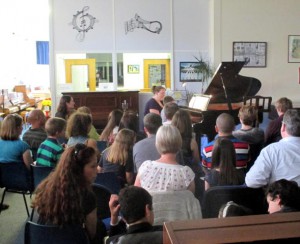Piano Recitals and Performances

Performing to a group can be scary
In every pianist’s career, there comes a point where their first public performance looms. Regardless of the skill of their tutor, this is likely to be a thoroughly stressful occurrence, taking the student out of their comfort zone and into a live performance situation. There are few players that feel entirely confident.
Piano recitals and performances need not be the stuff of recurring nightmares. Here are our pro tips for ensuring you pull off that all-important debut.
Prep and practice
In order to learn the piano, you need to invest the hours. The same is true when it comes to playing in front of an audience. The better you know your piece, the easier it will come, even when your fingers feel like they could be paralysed with fear.
Many piano students can play their Grade 1 or early recital pieces off by heart many years after the event occurred. That’s because they’ve committed them to ‘muscle memory’. The fingers and hands seem to move almost by themselves. If you get stage fright, this in-depth and rehearsed knowledge can help to carry you through.
On the day
Try to get a good night’s sleep – although that may be easier said than done – and approach performance day positively. When you’re well-rested, you’ll find it easier to focus, particularly if the recital is in the evening.
Eat well and stay hydrated, and ensure that you don’t over-do it with exercise. Try to stay busy; a little practice is no bad thing, but too much can cause mistakes and panic.
Obviously, it makes sense to avoid alcohol before a performance. In time, you might be able to enjoy a glass of fizz before playing, but your first big event is not the best time to experiment.
During the performance
Concentration is the name of the game in any piano recital, but that doesn’t mean you can’t have fun. The skill of playing is in the expression you give to the piece, so try to loosen up and enjoy the performance to prevent it becoming stiff.
After a few bars, you will probably develop ‘tunnel vision’, seeing only the music and the piano keys. If that’s the case, try not to look up, since a distracting smile or wink could break your focus.
Learning and growing
The vast majority of pianists come away from their first performance feeling great. When the adrenaline is pumping, you’ll be pleased that you overcame your nerves.
If you did make a mistake, don’t worry about it. Remember: a large proportion of the audience would not have noticed, and the ones that did will understand the pressure you are under when you perform.
If you’d like to learn more about playing the piano, or you would like to attend some recitals and performances, ask the team at Piano Workshop for advice. You can play any of our pianos in our showroom, and we also offer lessons that will help you hone and develop your skills.

